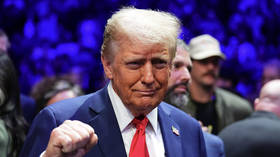Chip supplier Qualcomm seeks to avert ‘costly’ US ban on exports to Huawei – report
One of the world’s best-known chipmakers, Qualcomm is reportedly lobbying the US government to lift restrictions on dealing with Chinese tech giant Huawei not to lose the lucrative client to foreign rivals.
Qualcomm, which was one of the first American companies forced to cut ties with Huawei following last year’s blacklisting, wants to sell the Chinese company its chips for 5G phones, the Wall Street Journal reported citing a presentation by Qualcomm. The developer is still barred from selling the technology to Huawei under US regulations targeting Chinese businesses.
The chipmaker said that the restrictions could have cost it as much as $8 billion in lost annual revenue. According to Qualcomm, the ban failed to stop Huawei from getting necessary components elsewhere and only gave more market share to other firms to which Huawei turned to in order to beat Washington's pressure.
Also on rt.com Huawei will no longer produce its flagship chipsets due to US sanctionsQualcomm named South Korea’s Samsung and Taiwan’s MediaTek among the possible winners from the ban, saying that the policies have “inadvertently created massive financial opportunities for the two foreign competitors.” Earlier media reports indicated that Huawei had already sought to deepen ties with the latter, ordering more than 120 million chips from it.
Last year, the Trump administration put Huawei on a trade blacklist, officially known as the Entity List, effectively forbidding US businesses, including the likes of Qualcomm and Intel, from selling products to the Chinese tech giant unless granted special permission. The measures were toughened in May to prevent all foreign companies using US technology from selling semiconductors to the Chinese firm.
Also on rt.com US tech giants still doing business with blacklisted Chinese companies, research firm claimsThe latest move by Washington has already forced one of Huawei's main chip suppliers, Taiwan Semiconductor Manufacturing (TSMC), to stop taking orders from the company. Huawei relied on the firm to make its flagship Kirin chipsets and has recently acknowledged that it would not be able to produce them after September 15.
Given that Huawei is losing its major Taiwanese supplier and the fact that top Chinese mainland contractor – Semiconductor Manufacturing International Co. (SMIC) – makes less advanced processors, Qualcomm could win big from obtaining the license to get around the ban. According to the company it could generate billions of dollars in sales and help it fund the development of new technologies.
For more stories on economy & finance visit RT's business section












